Recent Comments
- Chodpa on The Place where the Primordial Speaks
- Chodpa on The Cuckoo of Presence
- Afzar on Bodhidharma’s teacher, Prajnatara
- Vajragoni on Audiobook is released
- Scott on Audiobook is released
-
Recent Posts
Categories
- A Darkness Visible
- A Docetic Assessment
- A Mystical Odyssey through the Sagathakam
- AI Creations
- Akṣayamatinirdeśasūtra
- Akṣhobhya’s Pure Land
- Ālaya-vijñāna
- Anūnatvāpūrṇatvanirdeśaparivarta
- Ariyapariyesanā Sutta
- Ascending the Noble Mountain of Primordial Perfection
- Asceticism
- Ashtavakra Gita in Light of the Unborn
- Audiobook
- Bankei Zen
- Beyond the Ascent
- Beyond the Rainbow Body
- Black Dragon Eye Mandala
- Bodhicitta
- Buddhadharma
- Buddhism’s Black Holes
- Buddhist Anecdotes
- Buddhist Hells
- Buddhist Meditations on the Tarot
- Chuang-Tzu
- Contemporary Musings
- Ḍākiṇī
- Dāsbodh
- Dharmakaya Abbey
- Dharmakaya Stick
- Divine Revelation
- Doctrine of the Void
- Dust Contemplation
- Ekacitta: Advanced Studies in Dark Zen
- Entry into the Dharmadhātu
- Eremitical Dhyani Meditations
- Exploring the Book of Revelation
- Gnostikos
- Hsin Hsin Ming
- Journey to the Center of the Mind
- Karma and Rebirth
- Korean Sŏn
- Kulayarāja Tantra—The Motherly Buddha
- Little Office of Our Lady of the Void
- LSD and Psychedelic Buddhism
- Māṇḍukya Kārikā
- Mañjuśrī Teaches Prajñāpāramitā
- Māra and Satan
- Meister Eckhart
- Mud and Water: Bassui Zen
- Mystagogia
- Nirvana
- Notes from the Iron Stupa
- Nothingness in Nāgārjuna and John of the Cross
- Obscure Religious Cults
- Preparation for the Afterlife
- Primordial Qigong
- Reflections on the Saṃdhinirmocana Sūtra
- Spirituality
- Springtime with Tozen
- Terma: A Mind Film by Vajragoni
- The Afterglow
- The Awakening of Faith
- The Bhagavad Gita
- The Book of Bodhi
- The Cloud of Unknowing in Light of the Unborn
- The Diamond Sutra
- The Divine Ātman
- The Divine Liturgy of Vajrasattva
- The Doctrine of Awakening
- The Dragon Mind of Zen Tarot
- The Elucidation of Consciousness
- The Experience of No-Self
- The Great Perfection of the Unborn Mind: A Book of Privy Counseling
- The Heart Sutra
- The Hermit's Den
- The Khaggavisāṇa Sutta: A Rhinoceros Horn
- The Lankavatara Sutra
- The Lankavatarian Book of the Dead
- The Lion's Roar of Queen Śrīmālā
- The Lotus Sutra
- The Mahāparinirvāṇasūtra
- The Naga Chronicles
- The Platform Sutra
- The Ratnagotravibhāgaśāstra
- The School of the Spirit
- The Secret Golden Light of the Unborn
- The Soul
- The Śūrańgama Sūtra
- The Sutra of Primordial Enlightenment
- The Tathāgatagarbhatārā Tantra
- The Udāna
- The Unborn Mind Mythos
- The Unborn Mind Sessions
- The Unborn Odyssey: A Novel
- The Vajrasamādhi Sutra
- The Vimalakirti Sutra
- The Yogasūtras of Patañjali
- The Zen Teaching of Bodhidharma
- The Zen Teaching of Instantaneous Awakening
- The Zen Teachings of Huang Po
- Theologia Mystica
- Tozen Teaching
- Tsung-mi: An Intimate Study
- Unborn I Ching
- Unborn Light Reiki
- Uncategorized
- Vasubandhu and the Absolute
- Wisdom from the Masters
- Wordsworth and Zen
- Yoga of the Manomayakāya
- Zen
- Zuowang
Archives
- October 2024
- August 2024
- February 2024
- January 2024
- December 2023
- November 2023
- October 2023
- September 2023
- August 2023
- July 2023
- June 2023
- May 2023
- April 2023
- March 2023
- February 2023
- January 2023
- December 2022
- November 2022
- October 2022
- September 2022
- August 2022
- May 2022
- April 2022
- March 2022
- February 2022
- January 2022
- December 2021
- November 2021
- October 2021
- September 2021
- August 2021
- May 2021
- April 2021
- March 2021
- February 2021
- January 2021
- December 2020
- November 2020
- October 2020
- September 2020
- August 2020
- May 2020
- April 2020
- March 2020
- February 2020
- January 2020
- December 2019
- November 2019
- October 2019
- September 2019
- August 2019
- June 2019
- February 2019
- January 2019
- December 2018
- October 2018
- August 2018
- April 2018
- March 2018
- February 2018
- January 2018
- December 2017
- November 2017
- October 2017
- September 2017
- August 2017
- May 2017
- April 2017
- March 2017
- February 2017
- January 2017
- December 2016
- November 2016
- October 2016
- September 2016
- August 2016
- July 2016
- May 2016
- April 2016
- March 2016
- February 2016
- January 2016
- December 2015
- November 2015
- October 2015
- September 2015
- August 2015
- July 2015
- June 2015
- May 2015
- April 2015
- March 2015
- February 2015
- January 2015
- December 2014
- November 2014
- October 2014
- September 2014
- August 2014
- May 2014
- April 2014
- March 2014
- February 2014
- January 2014
- December 2013
- November 2013
- October 2013
- September 2013
- August 2013
- May 2013
- April 2013
- March 2013
- February 2013
- January 2013
- December 2012
- November 2012
- October 2012
- September 2012
- August 2012
- May 2012
- April 2012
- March 2012
- February 2012
- January 2012
- December 2011
- November 2011
- October 2011
Meta
Tag Archives: women
The Astounding Assembly
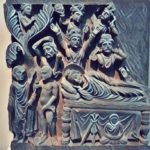
Our choice of translation for this series on the Mahāparinirvāṇasūtra is by Kosho Yamamoto, from Dharmakshema’s Chinese version and edited and revised by Dr. Tony Page in 2007. From time to time we will also draw-upon the translation from the Chinese by Mark L. Blum and the redacted version from the Chinese of Dharmakshema by Huiyan, Huiguan, and Xie Lingyun, translated into English by Charles Patton.
Posted in The Mahāparinirvāṇasūtra
Tagged Ānanda, Dharmakshema, Great Lament, Great Litany, Hua-yen, Icchantikas, Kusinagara, Rahula, sal trees, undivided mind, women
Leave a comment
Closing Teachings on Prajñāpāramitā
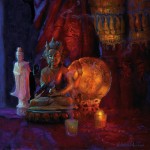
Painting by Peter Adams
At that time, Mañjuśrī addressed the Buddha, saying, “Bhagavān, in the cities and villages of Jambudvīpa, what should be the station of one who expounds the extremely profound Prajñāpāramitā?” The Buddha said to Mañjuśrī, “Now in this assembly, if there are people who hear Prajñāpāramitā, and all vow saying, ‘In a future life, I should always attain this manifestation of Prajñāpāramitā,’ then from this belief, in a future life, they will be able to hear this sūtra. It should be known that it is not from few good roots that such a person is able to accept and hear it with bliss. Mañjuśrī, if there is again someone who has heard this Prajñāpāramitā from you, then you should say, ‘In this Prajñāpāramitā, there is no Śrāvaka or Pratyekabuddha Dharma, or a Buddha Dharma, and also no dharmas of birth and death, of ordinary beings, and so on.’” Mañjuśrī addressed the Buddha, saying, “Bhagavān, suppose bhikṣus, bhikṣuṇīs, upāsakas, or upāsikās come and ask of me, ‘How does the Buddha expound Prajñāpāramitā?’ I would reply saying, ‘All dharmas are without conflicting characteristics, so how should the Tathāgata expound Prajñāpāramitā?’ Why? There is no perception of the existence of dharmas with which dharmas may conflict, and also no minds and consciousnesses of sentient beings which are able to know.
Single Action Samādhi
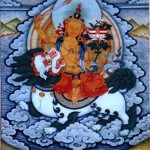
At that time, Mañjuśrī addressed the Buddha, saying, “Bhagavān, I contemplate the true Dharma which is unconditioned and without characteristics, without obtaining and without benefit, without birth and without death, without coming and without going, without one who knows, without one who perceives, and without one who acts. There is no perceiving Prajñāpāramitā, nor perceiving a realm of Prajñāpāramitā, being neither realization nor non-realization. It is not composing conceptual elaborations, and is without discrimination. All dharmas are endless and apart from any end. There is no Ordinary Person Dharma, Śrāvaka Dharma, Pratyekabuddha Dharma, or Buddha Dharma. There is neither attainment nor non-attainment, neither abandoning birth and death, nor realizing Nirvāṇa. There is neither conceivable nor inconceivable, neither doing nor nondoing. Such being the characteristic of the Dharma, how then should one learn Prajñāpāramitā?” At that time, the Buddha said to Mañjuśrī, “If one is able to thusly know the characteristics of the Dharma, then this is what is called learning Prajñāpāramitā. Bodhisattva-mahāsattvas who wish to learn the Bodhi Sovereign Samādhi, and having attained this samādhi, illuminate all extremely profound Buddha dharmas, as well as know the names of all buddhas, and in each case thoroughly understand the various buddha world realms without obstruction, should learn this Prajñāpāramitā spoken by Mañjuśrī.”
Cultivating Prajñāpāramitā II

Painting by Peter Adams
At that time, Mahākāśyapa addressed the Buddha, saying, “Bhagavān, in the coming age, if the extremely profound true Dharma is spoken thusly, who will be able to believe, understand, accept, and practice it?” The Buddha said to Kāśyapa, “If bhikṣus, bhikṣuṇīs, upāsakas, and upāsikās in this assembly are able to hear this sūtra thusly, then in the coming age, if they hear this Dharma again, they will certainly be capable of understanding the extremely profound Prajñāpāramitā. They will even be able to study, recite, believe, understand, accept, and maintain it, and they will be able to expound it to others and explain it. Consider a householder who is worried and distressed after losing a maṇi jewel. When it is found again later, his mind will be extremely happy. It is just like this, Kāśyapa. Bhikṣus, bhikṣuṇīs, upāsakas, and upāsikās, are also such as this, who have a mind of faith and happiness. If they do not hear the Dharma, then distress will arise, but when they are able to hear it, they will believe, understand, accept, and maintain it, always happy when studying and reciting it, extremely blissful and happy. It should be known that such a person is essentially perceiving the Buddha, and essentially serving and providing offerings to all buddhas.”
The Prostitute and the Buddha’s Hidden Organ
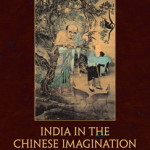
Finally, the Blessed One led Ananda and, walking in space, came to the debate hall. The Buddha took a seat and briefly taught about suffering, emptiness, Impermanence, and the perfections (paramila) to the assembly, but the women did not accept [his teaching].
The Illustrious Way
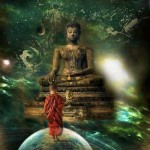
Then Queen Srīmālā made three more great vows before the Buddha, saying.
“I will benefit an infinite number of sentient beings through the power of these vows: first, I will, by my good roots, attain the wisdom of the true Dharma in all my lifetimes; second, after I have attained the true wisdom, wherever I may be born I will explain it untiringly to all sentient beings; third, in whatever form I may be born, I will not spare life or limb in embracing, protecting, and upholding the true Dharma.”
Posted in The Lion's Roar of Queen Śrīmālā
Tagged Dharma, Dharma-eye, Gnosis of the Dharma, Mahayana, pāramitā, Six Paramitas, women
Leave a comment
Women and the Unborn
(Haskel)
“I can tell you something about this matter of women’s Buddha Mind. I understand that women feel very distressed hearing it said that they can’t become buddhas. But it simply isn’t so! How is there any difference between men and women? Men are the Buddha Body, and women are the Buddha Body too. You shouldn’t entertain any doubts of this sort. When you thoroughly grasp the Unborn, then, in the Unborn, there’s no difference whether you’re a man or a woman. Everyone is the Buddha Body.
Victor Victoria
7 The Goddess, cont’d
Sariputra: Goddess, what prevents you from transforming yourself out of your female state?
Goddess: Although I have sought my “female state” for these twelve years, I have not yet found it. Reverend Sariputra, if a magician were to incarnate a woman by magic, would you ask her, “What prevents you from transforming yourself out of your female state?”
Sariputra: No! Such a woman would not really exist, so what would there be to transform?
Goddess: Just so, reverend Sariputra, all things do not really exist. Now, would you think, “What prevents one whose nature is that of a magical incarnation from transforming herself out of her female state?”
Thereupon, the goddess employed her magical power to cause the elder Sariputra to appear in her form and to cause herself to appear in his form. Then the goddess, transformed into Sariputra, said to Sariputra, transformed into a goddess, “Reverend Sariputra, what prevents you from transforming yourself out of your female state?” And Sariputra, transformed into the goddess, replied, “I no longer appear in the form of a male! My body has changed into the body of a woman! I do not know what to transform!”
The goddess continued, “If the elder could again change out of the female state, then all women could also change out of their female states. All women appear in the form of women in just the same way as the elder appears in the form of a woman. While they are not women in reality, they appear in the form of women. With this in mind, the Buddha said, ‘In all things, there is neither male nor female.'” Then, the goddess released her magical power and each returned to his ordinary form. She then said to him, “Reverend Sariputra, what have you done with your female form?”
Sariputra: I neither made it nor did I change it.
Goddess: Just so, all things are neither made nor changed, and that they are not made and not changed, that is the teaching of the Buddha.
Sariputra: Goddess, where will you be born when you transmigrate after death?
Goddess: I will be born where all the magical incarnations of the Tathagata are born.
Sariputra: But the emanated incarnations of the Tathagata do not transmigrate nor are they born.
Goddess: All things and living beings are just the same; they do not transmigrate nor are they born!
Sariputra: Goddess, how soon will you attain the perfect enlightenment of Buddhahood?
Goddess: At such time as you, elder, become endowed once more with the qualities of an ordinary individual, then will I attain the perfect enlightenment of Buddhahood.
Sariputra: Goddess, it is impossible that I should become endowed once more with the qualities of an ordinary individual.
Goddess: Just so, reverend Sariputra, it is impossible that I should attain the perfect enlightenment of Buddhahood! Why? Because perfect enlightenment stands upon the impossible. Because it is impossible, no one attains the perfect enlightenment of Buddhahood.
Sariputra: But the Tathagata has declared: “The Tathagatas, who are as numerous as the sands of the Ganges, have attained perfect Buddhahood, are attaining perfect Buddhahood, and will go on attaining perfect Buddhahood.”
Goddess: Reverend Sariputra, the expression, “the Buddhas of the past, present and future,” is a conventional expression made up of a certain number of syllables. The Buddhas are neither past, nor present, nor future. Their enlightenment transcends the three times! But tell me, elder, have you attained sainthood?
Sariputra: It is attained, because there is no attainment.
Goddess: Just so, there is perfect enlightenment because there is no attainment of perfect enlightenment.
Then the Licchavi Vimalakirti said to the venerable elder Sariputra, “Reverend Sariputra, this goddess has already served ninety-two million billion Buddhas. She plays with the superknowledges. She has truly succeeded in all her vows. She has gained the tolerance of the birthlessness of things. She has actually attained irreversibility. She can live wherever she wishes on the strength of her vow to develop living beings.”
Posted in The Vimalakirti Sutra, Zen
Tagged attainment, Buddha-gnosis, Vimalakirti Sutra, women
Leave a comment
